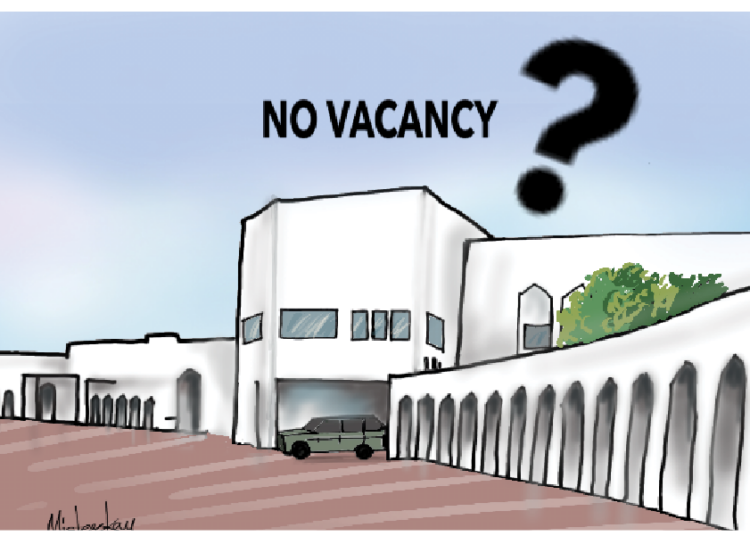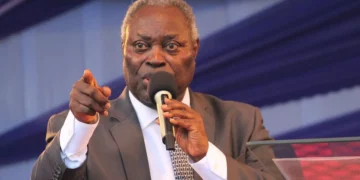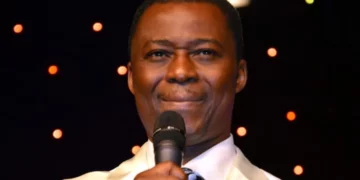Secretary to the Government of the Federation (SGF) and former Benue State Governor George Akume is undeniably a seasoned politician who has been instrumental in the emergence of all the governors who succeeded him. Curiously, however, he has consistently fallen out with each of them over time.
The Fall Out
After completing his eight-year tenure as governor from 1999 to 2007, Akume was pivotal in Gabriel Suswam’s rise to the governorship of Benue State. Suswam also served for eight years, but not without clashing with Akume. In fact, Akume pitched a tent with Professor Steven Ugbah, former Nigerian Ambassador to Russia, when Suswam was seeking re-election. But of course, Suswam won. Before the end of Suswam’s tenure in 2015, their relationship soured beyond repair. To spite Suswam, Akume aligned with then opposition All Progressives Congress (APC) and facilitated Governor Samuel Ortom’s victory over the PDP candidate, Terhemen Tarzoor.
Ortom’s story is exceptional. In the build-up to the 2015 general elections, he initially contested for the PDP ticket and lost to Tarzoor. However, Akume wooed him to the APC, and despite resistance from some aspirants, he was handed the party’s ticket.
Akume led the APC to defeat the PDP, which resulted in Ortom’s victory in the 2015 governorship election, further demonstrating his political acumen. But midway through Ortom’s first term, he and Akume also fell out. In spite of this, Ortom—who eventually decamped to his original party, the PDP—secured a second term and even ensured Akume lost his bid to return to the Senate.
Undeterred, Akume waited patiently for four years, using the period to deploy his political prowess in ensuring the APC candidate, Father Hyacinth Alia, defeated Titus Uba of the PDP in the 2023 Benue governorship race. Yet, less than two years into Alia’s tenure, his relationship with Akume has deteriorated.
A recurring pattern emerges: Akume aids his successors but invariably falls out with them. Clearly, something is amiss. One would need to hear directly from Akume and the trio of Suswam, Ortom, and Alia to pinpoint the issue without speculation. Could this fallout be like that of former Governor Nyesom Wike and his successor, Sim Fubara of Rivers State, over the struggle for control of the party structures? Your guess is as good as mine
Don’t get it twisted. The focus here isn’t merely on Akume’s strained relationships with his successors but on his emphatic assertion that there will be no vacancy in the Presidential Villa come 2027. Was Akume serious when he declared this, or was he joking? Does this imply there won’t be a 2027 presidential election?
Same Old Song
We have been through this route before; this is not the first time such a narrative of no vacancy has emerged. Often, during a president’s first term, we hear people close to the seat of power singing this vexed tune of ‘no vacancy’, probably because our constitution empowers a president to seek reelection. SGF Akume merely reechoed that when he recently called on politicians eyeing the presidency in 2027 to wait until 2031, when President Bola Tinubu must have completed his second term.
“There is no vacancy in the presidency as President Bola Tinubu has not lost his goodwill amongst Nigerians. So, people eyeing the office must wait until 2031, when the President must have completed his second term,” he stated
I can bet with my last penny that had the SGF not been part of this government, he most certainly would have been singing a different tune about the vacancy at the Villa come 2027. I am trying hard to imagine an Akume saying that in 2014…
Assuming, without conceding, that there is indeed no vacancy, shouldn’t Akume prioritize addressing the current hardship faced by Nigerians? Why is there a preoccupation with the 2027 election when the government has yet to fulfil its campaign promises?
It is disheartening that, despite pressing issues such as insecurity, currency depreciation, crumbling infrastructure, a deplorable state of healthcare and education systems, rising unemployment, and widespread poverty, the discourse has shifted prematurely to the 2027 elections.
The hype about the 2027 election now is a needless distraction. Nigerians are grappling with the adverse effects of poorly implemented policies. Governance must refocus to deliver the fundamental dividends of democracy.
Although Akume is undoubtedly brilliant and well-suited for his role as SGF, his remarks on the 2027 elections suggest a misplaced priority. His office is too pivotal to be consumed by electoral speculations, especially during these challenging times.
Essentially, SGF Akume knows he lacks the moral right to decide who Nigerians should become their president. The Nigerian constitution clearly states President Tinubu’s tenure expires after four years. There will be an election afterwards to all elective offices, including the presidency. Nigerians who are qualified and willing to contest can freely do that and expect to be elected by their compatriots. To declare that there is no vacancy is indicative of asking Nigerians to shelve their ambition.
A Feeling Of Trepidation
If anything, Akume’s submission shows that the president’s camp is filled with trepidation and insecurity. The president’s men fear that Nigerians are waiting for an opportunity, which the election best provides, to vent their anger over the current hardship arising from ill-thought-out policies. Citizens are experiencing skyrocketing commodity prices in the midst of poor economic reforms that have put millions of Nigerians into poverty.
How will they explain to Nigerians that the subsidy was removed without clear-cut measures to cushion the impact? How will they explain that the government unified the forex to let the market forces determine the exchange rate and give us the actual value of the naira at a time when the manufacturing sector is dead, with the nation importing virtually everything it uses?
This government embarked on an unintended but systematic devaluation of the naira under the guise of stimulating economic growth and attracting foreign direct investment, which will eventually boost economic activities in the country. We ended up with a very wide gap between the value of the naira vis-à-vis the value of the dollar and other major currencies. As you read this, the nation is also grappling with a headline inflation which is currently at 34.19%.
How will they convince Nigerians, especially residents of worst-hit areas like Zamfara, Sokoto, and others battling insecurity, that the government’s promise to combat the menace was not a ruse? What about the tax reform bills that many in the North, with its huge voting power, perceive as skewed against it?
Many Nigerians believe the current policies are detached from the nation’s realities, driven more by International Monetary Fund (IMF) and World Bank prescriptions than domestic needs.
The ruling party and the President’s men know that several questions agitate the minds of Nigerians. These concerns, simmering quietly now, will likely erupt in 2027, with the ballot box serving as the ultimate venue for redress.
Nigeria needs visionary leadership that prioritizes internal development, drawing lessons from countries like China, Brazil, and Singapore. A credible election presents an opportunity to get such. Akume and those who share his views know this too well. They must abandon the notion that there is no vacancy. Indeed, the Villa will be up for contest in 2027!
Riveting Comebacks
There is no contesting the fact that America’s president-elect, Donald Trump, and his Ghanaian counterpart, John Mahama, have made records for their dramatic comebacks. Against all odds, Trump staged a return and will be the next occupant of the White House.
Like Trump, Mahama, who, as President, sought re-election in 2016 but lost to New Patriotic Party candidate Nana Akufo-Addo, defied all odds to clinch the coveted seat and will assume office on January 7. Back home, Rabiu Kwankwaso, Ayo Fayose and Kayode Fayemi staged a comeback as governors of Kano and Ekiti States and succeeded. But is a presidential comeback possible in Nigeria?





